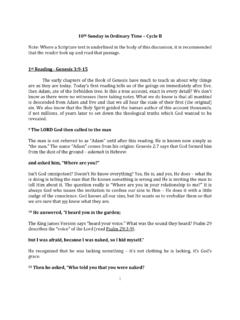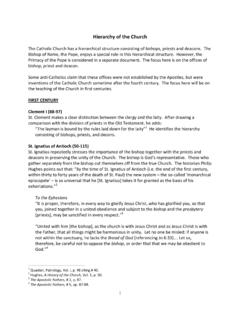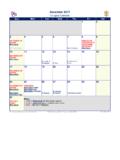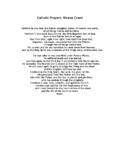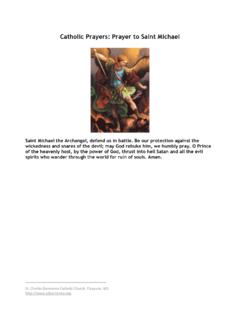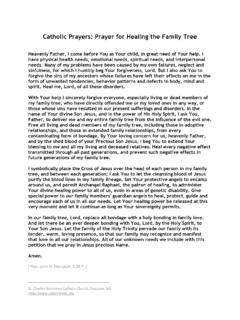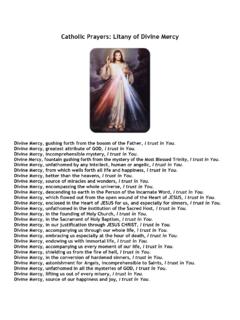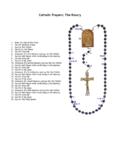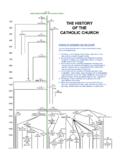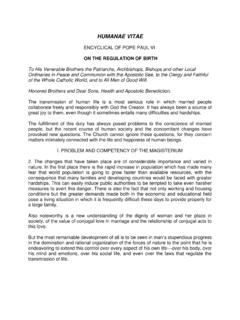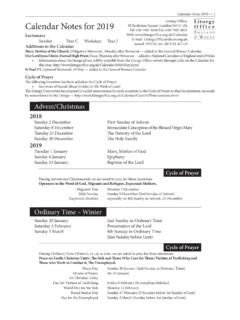Transcription of 4th Sunday of Lent - Cycle C - Charles Borromeo
1 1 4th sunday of lent cycle c Note: If there are some of The Elect at the Mass, the readings given for Cycle A may be used. The alternate Gospel reading is about the blind man who washes in the pool of Siloam. This reminds The Elect of the refreshing waters of baptism which they will soon receive at the Easter Vigil Mass. Note: Where a Scripture text is underlined in the body of this discussion, it is recommended that the reader look up and read that passage. 1st Reading - Joshua 5:9a, 10-12 The common theme for all three readings of this Mass is reconciliation. The book of Joshua is the first of the historical books, immediately following the Torah in the Bible. Today we will add another chapter to the story of the Israelites. Moses has died; Joshua is the new leader. The people have crossed the Jordan River on dry land (Joshua 3:15-17), reminiscent of their escape from Egypt through the Reed Sea. At God s command, Joshua has appointed twelve men, one from each tribe of Israel to each take up a stone from the middle of the (dry for the crossing) Jordan.
2 These stones have been set up as a memorial of their crossing on dry ground. In the future, when the children among you ask their fathers what the stones mean, you shall inform them, Israel crossed the Jordan here on dry ground. For the Lord, your God, dried up the waters of the Jordan in front of you until you crossed over, just as the Lord, your God, had done at the Red Sea, which He dried up in front of us until we crossed over; in order that all the peoples of the earth may learn that the hand of the Lord is mighty, and that you may fear the Lord, your God, forever." (Joshua 4:21-24) Circumcisions were then performed as none had been done on those who had been born during the 40 year sojourn in the desert (Joshua 5:4-5). This now brings us to today s reading and the celebration of the Passover in the Promised Land. 9a [T]he LORD said to Joshua, Today I have removed the reproach of Egypt from you.
3 The Hebrew translated as removed is literally rolled (galloti). What the reproach is, is uncertain. Some have interpreted it is the state of non-circumcision while others interpret it as slavery, which has now come to an end with the entry into the promised land. 10 While the Israelites were encamped at Gilgal on the plains of Jericho, 2 Two meanings have been suggested for Gilgal: 1) to roll because of its similarity to the Hebrew verb (gll) 2) circle (of stones) for the 12 stones which were placed in a circle as a memorial In any case, the exact location is uncertain but it is close to Jericho, it was a holy place in the days of Samuel, and the place where Saul was installed as king (1 Samuel 11:14-15). they celebrated the Passover on the evening of the fourteenth of the month. This corresponds with the date of the original Passover (see Numbers 33:3). 11 On the day after the Passover they ate of the produce of the land in the form of unleavened cakes and parched grain.
4 The feast of unleavened bread. Only unleavened bread was to be eaten for a week beginning with the day of Passover (Exodus 12:14-20). On that same day 12 after the Passover on which they ate of the produce of the land, the manna ceased. No longer was there manna for the Israelites, who that year The 40th year since the exodus ate of the yield of the land of Canaan. 2nd Reading - 2 Corinthians 5:17-21 In our first reading we heard about how the Israelites, once they had reached the promised land, reconciled themselves with God by circumcising and celebrating the Passover and Feast of Unleavened Bread. In today s epistle reading St. Paul spells out the process whereby God s saving love touches human lives. 17 So whoever is in Christ is a new creation: Anyone who belongs to the believing community, which is Christ (1 Corinthians 6:15; 8:12; 12:12) the old things have passed away; The Old Covenant behold, new things have come.
5 The redemptive activity of Jesus radically changes those who allow themselves to be affected by it (see Romans 6:4; 8:9-10; Galatians 6:15). The old things, the Old Covenant, 3 are no more (2 Corinthians 3:11). The word kaine (new) designates not just something that has recently appeared but rather a new manner of being, differing essentially from what was habitual before. The crucifixion and resurrection of Jesus is for Paul the dividing line between two periods of history of the world. Christ instituted the world to come when He instituted the New Covenant. 18 And all this is from God, God alone is the author of the new covenant. who has reconciled us to himself through Christ See Romans 5:10-12. and given us the ministry of reconciliation, This is the apostolate given to Paul by God through Jesus (Acts 26:15-18). This is also the commission given to all the apostles (John 20:21-23). In fact, when Jesus and the apostles first went out baptizing (John 3:23), they were administering the baptism of repentance the same as John the Baptist, not a sacramental baptism which wasn t commissioned by Jesus until after the resurrection (Matthew 28:19).
6 19 namely, God was reconciling the world to himself Forgiving sins in Christ, The agent not counting their trespasses against them As He had done at the sin of Adam and at the golden calf God was in Christ, that is to say, the Father was in the Son, reconciling the world to Himself, not counting their sins against them. Creation sinned against God and did not repent, so God, who did not want His work to perish, sent His Son in order to preach through Him the forgiveness of sins and thus reconcile them to Himself. [The Ambrosiaster (between 366-384), Commentaries on Thirteen Pauline Epistles] and entrusting to us the message of reconciliation. They are to preach the gospel, to baptize, and even to forgive sins as His emissary (John 20:19-23). 4 20 So we are ambassadors for Christ, Not merely representatives but prolonging the mission of Christ by being His instrument ( he who hears you hears Me ).
7 As if God were appealing through us. This underlines God s respect for the freedom of His creatures it must be our decision, not God s. Reconciliation can be lost; those who have accepted the Gospel must always allow it to exercise its effect upon them. We implore you on behalf of Christ, be reconciled to God. 21 For our sake he made him to be sin Jesus became the ultimate sin sacrifice so that heaven could be opened and our sins could be forgiven and forgotten. who did not know sin, Jesus is God and therefore sinless (Romans 7:1). so that we might become the righteousness of God in him. We can have our sins forgiven and forgotten and become sinless like God Himself. Gospel - Luke 15:1-3, 11-32 Our gospel reading today is the parable of the prodigal son; perhaps it should be renamed the parable of the loving father because he is really the star of the story. This parable is found only in Luke s gospel.
8 The parable plays upon the hearer s knowledge of two brothers stories, in which the younger triumphs over the elder: 1) Esau and Jacob (Genesis 25:27-34; 27:1-36) and Joseph and his brothers (Genesis 37:1-4). Jesus doubly reverses expectations: the prodigal son is a parody of the successful younger brother; the elder son is not vanquished, but invited to the feast. 15:1 [T]ax collectors and sinners were all drawing near to listen to him, 2 but the Pharisees and scribes began to complain, The scribes and Pharisees were scandalized by the fact that Jesus associated with people of this ilk (see Luke 5:30; 7:34). saying, This man welcomes sinners and eats with them. To the Pharisees, a man was known by the company he keeps. Jesus, of course, came to lead 5 them to salvation by setting the example for them to follow. 3 So to them he addressed this parable: 11[ ] A man had two sons, 12 and the younger son said to his father, Father, give me the share of your estate that should come to me.
9 The estate was not necessarily divided only upon the death of the father. The inheritance was usually given when the son married; when he needed it the most. The eldest got two parts and each other son got one part. Sirach argued against this practice (Sirach 33:19-23). So the father divided the property between them. 13 After a few days, the younger son collected all his belongings and set off to a distant country where he squandered his inheritance on a life of dissipation. Just as we can lose our inheritance (heaven) through sinful acts, the son squanders his through unrestrained sensuality and spendthrift extravagance. Adam and Eve lost the garden of Eden through sin. 14 When he had freely spent everything, a severe famine struck that country, and he found himself in dire need. 15 So he hired himself out to one of the local citizens who sent him to his farm to tend the swine. To do things which only Gentiles did.
10 Pigs were unclean animals and anyone who touched them became unclean (Leviticus 11:7-8). The sinner has further isolated himself from God. 16 And he longed to eat his fill of the pods on which the swine fed, The fruit of the carob tree but nobody gave him any. He was totally isolated. He must have stolen his food. This is the anxiety and emptiness a person feels when he is far from God. This is what enslavement to sin involves (Romans 6:6; Galatians 5:1) by sinning one loses the freedom of the children of God (Romans 8:21; Galatians 5:13) and hands oneself over to the power of Satan. 17 Coming to his senses he thought, How many of my father s hired workers have more than enough food to eat, but here am I, dying from hunger. 18 I shall get up and go to my father His memory of home and his conviction that his father will not turn him away cause the son to reflect and decide to set out on the right road. and I shall say to him, Father, I have sinned against heaven and against you.
